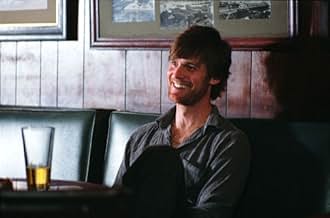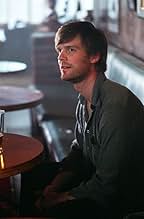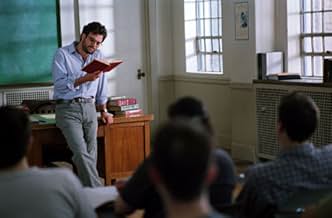CALIFICACIÓN DE IMDb
6.3/10
10 k
TU CALIFICACIÓN
Agrega una trama en tu idiomaAn indiscretion between two close friends tears down their respective marriages.An indiscretion between two close friends tears down their respective marriages.An indiscretion between two close friends tears down their respective marriages.
- Dirección
- Guionistas
- Elenco
- Premios
- 2 premios ganados y 4 nominaciones en total
- Dirección
- Guionistas
- Todo el elenco y el equipo
- Producción, taquilla y más en IMDbPro
Argumento
¿Sabías que…?
- TriviaThe Irish step dance scene starts with a cutaway where the center dancer is actually a male dancer.
- Citas
[on Hank and Terry]
Edith Evans: I think he want to have sex with her.
Jack Linden: Why?
Edith Evans: Why?
Jack Linden: Yeah.
Edith Evans: Because he likes her and she's pretty. And he hasn't had any strange pussy since that French cunt.
- Créditos curiososSpecial Thanks To Christine & Ben Christine, Terry & Kelly Kris & Fisher
- ConexionesFeatured in The 20th IFP Independent Spirit Awards (2005)
- Bandas sonorasJungle Warrior
Written by John Otieno
Performed by Matata
Courtesy of President Records Ltd. UK
Opinión destacada
A serious and emotionally engaging melodrama that tells of two marriages, of love, friendship, adultery, faithfulness, parenting, and the delicate balance between being true to the spirit within and being responsible about the consequences in the real world.
Mark Ruffalo and Peter Krause play two college tutors of English literature, working away and also trying to get published in their own right in their spare time. They are close buddies and have loving, beautiful wives (Naomi Watts and Laura Dern). We have four 'ordinary people' who are far from caricatures they have sensitivities, intelligence, emotional aspiration and weakness as they struggle with their own stymied abilities to find happiness and fulfilment both for themselves and the ones they love.
We Don't Live Here Anymore looks at the reality of marriage in a less than rose-tinted light. The performances by Watts and Dern shine forth with increasing emotional intensity, and the efforts of their husbands to stage-manage some sort of acceptable compromise ricochet on the fringes of a dark despair that forever looms and threatens to engulf everyone. As the characters realise their increasingly complex shenanigans are verging on disaster, it leads them to ever deeper self-examination of their true feelings. And yet sometimes the children have a greater realisation of what's going on than do their parents. The film's closing scene ("Because I can") reminds us that the element of choice, true and ongoing, is so often lacking in marriage, sometimes even in relatively small things once marriage has been consummated, the rest becomes duty and infidelity is often driven by compulsion - so the elements of ongoing freewill (jointly and singly) can be hard to find.
This movie has been compared to Closer and rightly so it is for mature, thinking audiences who can come to terms with deep imperfections and use the depths of what it takes to be truly human to make things better (or find a way forward that has emotionally honesty). The 'moral right' will dismiss both films not so much out of a sense of superiority ('adultery never pays') but simply through lack of understanding.
The heavy-going nature of the film is alleviated by shots of rare beauty in the surrounding countryside, elegantly photographed, and by the playfulness of the several children. Watts (nearly 38 but still looking 24) and Dern (who appears older, but attractive in a very different way) each show elements of femininity that their characters are desperate to satisfy the need to be wanted and the need to be loved. To appreciate the film it is necessary to see the scenarios from both the viewpoints of the women and of the men. Everybody cares about the kids. Beyond that, the love that is expected of the spouse is at odds with the love that they try to give, so they all feel like 'objects' to their respective partners. The lack of understanding breaks down into infidelity, which (so the film might argue) can almost be a healing balm. "It's much easier living with a woman who feels loved", remarks a cuckolded husband. It's a film where no-one has all the answers (though not for want of trying) and so in some ways a testament to humanity. Sadly, many will see it as just another cynical take on dysfunctional relationships, but the open minded viewer may find a lot more, for this film is a well-made (if not exceptional) work of art that contributes more to the understanding of the human condition than any cutesy, idealised portrayal of happy families.
Mark Ruffalo and Peter Krause play two college tutors of English literature, working away and also trying to get published in their own right in their spare time. They are close buddies and have loving, beautiful wives (Naomi Watts and Laura Dern). We have four 'ordinary people' who are far from caricatures they have sensitivities, intelligence, emotional aspiration and weakness as they struggle with their own stymied abilities to find happiness and fulfilment both for themselves and the ones they love.
We Don't Live Here Anymore looks at the reality of marriage in a less than rose-tinted light. The performances by Watts and Dern shine forth with increasing emotional intensity, and the efforts of their husbands to stage-manage some sort of acceptable compromise ricochet on the fringes of a dark despair that forever looms and threatens to engulf everyone. As the characters realise their increasingly complex shenanigans are verging on disaster, it leads them to ever deeper self-examination of their true feelings. And yet sometimes the children have a greater realisation of what's going on than do their parents. The film's closing scene ("Because I can") reminds us that the element of choice, true and ongoing, is so often lacking in marriage, sometimes even in relatively small things once marriage has been consummated, the rest becomes duty and infidelity is often driven by compulsion - so the elements of ongoing freewill (jointly and singly) can be hard to find.
This movie has been compared to Closer and rightly so it is for mature, thinking audiences who can come to terms with deep imperfections and use the depths of what it takes to be truly human to make things better (or find a way forward that has emotionally honesty). The 'moral right' will dismiss both films not so much out of a sense of superiority ('adultery never pays') but simply through lack of understanding.
The heavy-going nature of the film is alleviated by shots of rare beauty in the surrounding countryside, elegantly photographed, and by the playfulness of the several children. Watts (nearly 38 but still looking 24) and Dern (who appears older, but attractive in a very different way) each show elements of femininity that their characters are desperate to satisfy the need to be wanted and the need to be loved. To appreciate the film it is necessary to see the scenarios from both the viewpoints of the women and of the men. Everybody cares about the kids. Beyond that, the love that is expected of the spouse is at odds with the love that they try to give, so they all feel like 'objects' to their respective partners. The lack of understanding breaks down into infidelity, which (so the film might argue) can almost be a healing balm. "It's much easier living with a woman who feels loved", remarks a cuckolded husband. It's a film where no-one has all the answers (though not for want of trying) and so in some ways a testament to humanity. Sadly, many will see it as just another cynical take on dysfunctional relationships, but the open minded viewer may find a lot more, for this film is a well-made (if not exceptional) work of art that contributes more to the understanding of the human condition than any cutesy, idealised portrayal of happy families.
- Chris_Docker
- 27 jun 2005
- Enlace permanente
Selecciones populares
Inicia sesión para calificar y agrega a la lista de videos para obtener recomendaciones personalizadas
- How long is We Don't Live Here Anymore?Con tecnología de Alexa
Detalles
- Fecha de lanzamiento
- Países de origen
- Sitios oficiales
- Idioma
- También se conoce como
- We Don't Live Here Anymore
- Locaciones de filmación
- Productoras
- Ver más créditos de la compañía en IMDbPro
Taquilla
- Presupuesto
- USD 3,000,000 (estimado)
- Total en EE. UU. y Canadá
- USD 2,041,014
- Fin de semana de estreno en EE. UU. y Canadá
- USD 101,295
- 15 ago 2004
- Total a nivel mundial
- USD 3,361,213
- Tiempo de ejecución1 hora 41 minutos
- Color
- Mezcla de sonido
- Relación de aspecto
- 2.35 : 1
Contribuir a esta página
Sugiere una edición o agrega el contenido que falta

Principales brechas de datos
What is the Spanish language plot outline for La Tentación (2004)?
Responda


























